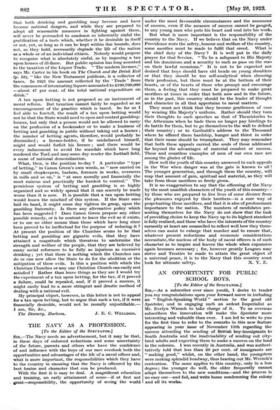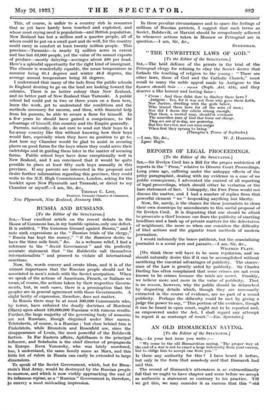AN OPPORTUNITY FOR PUBLIC SCHOOL BOYS.
[To the Editor of the SPECTATOR.] Sm,—As a subscriber ever since youth, 1 desire to tender you my congratulations upon your forward move in including an " English-Speaking World " section to the good old Spectator, and in engaging such an ardent Imperialist as Mr. Evelyn Wrench to take charge of it. To .us overseas subscribers the innovation will make the Spectator more interesting and valuable than ever. I am led to write to you for the first time to refer to the remarks in this new feature appearing in your issue of November 11th regarding the success attending the sending of British boy-immigrants to South Australia and the inadvisability of sending out city- bred adults and expecting them to make a success on the land in the colonies. I was recently in Australia, and was authori- tatively told that less than 20 per cent. of immigrants are " making good," whilst, on the other hand, the youngsters were making splendid headway, thus bearing out Mr. Wrench's contention. The same applies to this country, only in a less degree; the younger do well, the older frequently cannot adapt themselves to -the new conditions—and the process is no easy one—and fail, and write home condemning the colony and all its works. This, of course, is unfair to a country rich in resources that as yet have barely been touched and exploited, and whose most crying need is population—and British population. New Zealand has but a million and a quarter people, all of whom could be put on a small part and do well, for the country could carry in comfort at least twenty million people. This province—Taranaki—is nearly 2f million acres in extent and has but 63,000 people, yet the value of its annual exports of produce—mostly dairying—averages. about £80 per head. Here's a splendid opportunity for the right kind of immigrant, The climate is wonderfully equable, the mean- temperature in summer being 61.1 degrees and winter 48.3 degrees, the average annual temperature being 55 degrees.
I understand that many of the lads from the public schools in England desiring to go on the land are looking toward the colonies. There is no better colony than New Zealand, and no better part of New Zealand than Taranaki. A public school lad could put in two or three years on a farm here, learn the work, get to understand the conditions and the methods necessary for success, and then, with financial help from his parents, be able to secure a farm for himself. In a few years he should have gained a competence, to the advantage of himself, this country and the Empire generally.
Parents, naturally, do not care to send out their boys to a far-away country like this without knowing how their boys would fare, especially when they have no position to go to. Just here my Chamber would be glad to assist in securing places on good farms for the boys where they could serve their cadetships and in guiding them later in the matter of securing farms. Public school boys have done exceptionally well in New Zealand, and I am convinced that it would be quite possible to place at least fifty such boys annually in this province. If any parents are interested in the proposal and desire further information regarding this province, they could write to the N.Z. High Commissioner; London, asking for the booklet upon New Plymouth and Taranaki, or direct to my Chamber or myself.—I am, Sir, &e.,
THOMAS C. LIST, President, Taranaki Chamber of Commerce. New Plymouth, New Zealand, January 18th.











































 Previous page
Previous page